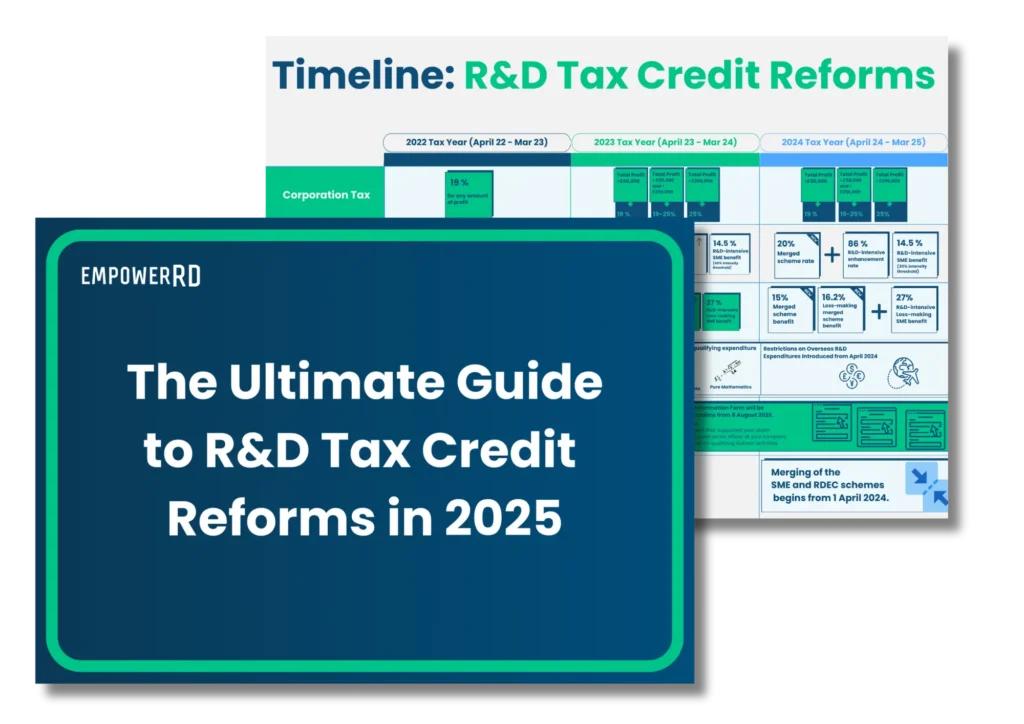With Keir Starmer stepping in as Prime Minister on July 5th, the UK is embarking on a new chapter focused on economic growth and innovation. The Labour government, led by Starmer and Chancellor Rachel Reeves, has unveiled plans to position the UK as a leader in research and development (R&D). Building on the previous Conservative administration’s emphasis on innovation and R&D, Labour aims to create a dynamic environment where innovation thrives and businesses flourish.
Under Starmer’s leadership, the focus is clear: champion cutting-edge technologies, support ethical AI, and ensure that the UK remains at the forefront of global advancements. By prioritising R&D within their broader economic strategy, they’re committed to building a future where businesses grow stronger and the UK economy reaches new heights.
What are their upcoming plans?
Stay ahead with the latest in R&D tax relief
Subscribe to our newsletter for the freshest updates today!
Stable R&D tax credits
We suspected that R&D tax relief would remain the same when Labour released their Business Partnership for Growth prospectus, pledging to maintain the current R&D tax credits structure through the next parliament, noting:
“There has been far too much chopping and changing in recent years, with five changes this parliament alone. To provide stability, Labour will maintain the current structure of R&D tax credits over the next parliament, while cracking down on fraudulent claims and those made in error.”
This was confirmed during The International Investment Summit on 14th October 2024, when Rachel Reeves stated:
“We will maintain a world-leading capital allowances offer, with full expensing, and the £1 million annual investment allowance, and we will maintain the current rates for the research and development reliefs which provide generous support for innovation. This is a vital step to deliver certainty and support businesses to grow.”
With Labour now in power, many claimants will be relieved to hear that no major changes are planned for the scheme. Recent changes have put a lot of pressure on businesses, but it looks like stability will be maintained under a Labour government.
Sector-by-sector evaluation of R&D tax credits
Labour is also planning to evaluate the R&D tax relief scheme sector by sector, starting with life sciences. They believe a detailed analysis will allow them to pinpoint where the scheme works best and where it needs tweaks, ensuring tax credits are as beneficial as possible while cutting down on fraud and errors.
It’s still unclear how this will work with HMRC’s ongoing efforts to tackle fraudulent claims. However, it’s good to hear that Labour plans to continue the existing government’s work on cracking down on fraudulent claims.
Introduction of 10-year R&D budgets
Looking beyond tax credits and into the broader R&D and innovation landscape, Labour has announced some interesting policies in its manifesto.
Labour aims to fix the issue of short-term funding cycles that hinder long-term partnerships between research bodies like UK Research and Innovation (UKRI) and industry. By setting ten-year budgets for R&D in its first Comprehensive Spending Review, Labour plans to provide the stability needed for meaningful, lasting collaborations and infrastructure projects.
This approach is similar to the successful model of the Aerospace Technology Institute (ATI), which attracts £7 of private investment for every £1 of public money thanks to its ten-year funding settlement. Plus, Labour intends to cut down on excessive bureaucracy and introduce a system of earned trust, letting researchers focus more on innovation and less on repetitive reporting.
New Regulatory Innovation Office
Labour is also planning to create a new Regulatory Innovation Office (RIO) by merging existing government functions. The RIO will help regulators update rules, speed up approval times, and coordinate issues across different sectors. Details are a bit scarce right now and Labour will need to release a lot more information if they get into power.
Incentivising investment and entrepreneurship
Labour remains committed to the Seed Enterprise Investment Scheme (SEIS) and the Enterprise Investment Scheme (EIS), vital for stimulating early-stage investment. By maintaining these schemes beyond their 2025 sunset clauses, Labour ensures continued support for innovative startups. They also plan to review the scope and scale of these schemes to ensure they provide sufficient incentives for investors, addressing potential limitations that may hinder high-potential businesses.
Supporting University Spinouts
Labour also plans to roll out key measures to support university spinouts, which transition academic research into real-world innovations. Their proposals include:
- Transparency: An annual University Spinout Dashboard with metrics like equity stakes and intellectual property agreements.
- Founder-Track Agreements: Deals where founders can negotiate equity stakes below 10% in exchange for university support, making spinouts more attractive to investors.
- Collaboration: Encouraging Technology Transfer Offices (TTOs) to work together more closely, standardising processes and sharing expertise.
These steps aim to streamline the funding process, increasing the number of successful spinouts and strengthening the link between academia and industry.
Additional innovation and R&D support
Lastly, labour has also expressed a dedication to fostering ethical AI and inclusive technology. It emphasises the responsible development of new technologies within a framework that encourages innovation while upholding ethical standards.
Closing thoughts
The Labour Party’s proposals signify a promising future for innovation and R&D in the UK. By providing stability in R&D tax credits, introducing long-term R&D budgets, incentivising investment and entrepreneurship, and supporting university spinouts, the Starmer-led administration is well-positioned to drive growth and make the UK a global leader in research and development. If these plans come to fruition, businesses and researchers alike can look forward to a more robust and dynamic innovation landscape.












